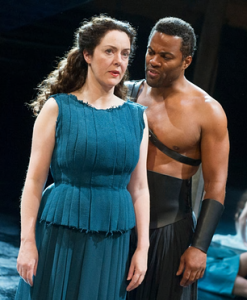On Saturday October 3rd the RSC is holding the latest in its series of debates on subjects raised by plays in its repertoire, Reporting War: Whose Truth is Told?
The debate specifically accompanies the RSC’s new production of Hecuba, Marina Carr’s version of Euripides’ Greek tragedy, which follows the trials of Queen Hecuba, but it’s equally appropriate for Shakespeare’s Henry V, currently in the RSC repertoire. Shakespeare relied heavily on accounts of British history, written by the victors. Shakespeare’s often criticised for the way he characterises historical figures, especially Richard III, but almost all the views he expresses are the official versions promoted by the Tudors and Stuarts.
The debate at the Swan will discuss how elusive the truth can become in times of conflict. Carr’s play follows the story of Hecuba, the widowed Queen of Troy whose children are also targeted in the upheavals that followed the Trojan War. It’s a story as relevant now as it was when the ancient Greeks saw it.
Those on the panel will include the author Marina Carr, its director Erica Whyman, BBC Security Correspondent Frank Gardner and Dr Fiona Macintosh, Director of the Archive of Performances of Greek and Roman Drama at the University of Oxford.
Carr’s play contains the line “They will lie about what happened this day….’ and although Shakespeare was not attempting a faithful telling of the facts, always being more interested in making a successful play, he is certainly interested in how the story is transmitted. In his magnificent speech before the battle of Agincourt Henry V reminds his troops that they are making history:
This story shall the good man teach his son,
And Crispin Crispian shall ne’er go by
From this day to the ending of the world
But we in it shall be remembered.
This was particularly brought home in Matthew Warchus’s production of the play in 1994 with Iain Glen playing the king. In the previews, during the battle scenes scribes, perched high up on tennis-umpire-style ladders, could be seen busily writing: history being recorded as it happened. Sadly this detail was dropped from the production, I imagine because the ladders proved a hazard to actors on the stage as well as the people sitting on them. There were other features in the production that made the same point: in his Sunday Times review, John Peter noted that from the very beginning, “the play speaks with two voices. It speaks of the past, and to the present. Tony Britton is the Chorus, taking the stage with massive confidence: a rock-like, dignified presence in a modern military overcoat with a poppy in his buttonhole. Behind him, a medieval royal robe is displayed, surrounded by poppies on high stalks. You are, simultaneously, in the past and the present.
There are moments when Shakespeare does lift details from his sources almost as written. Hearing that his old friend Bardolph is condemned to die for stealing from a church, Shakespeare’s Henry does not soften: “We would have all such offenders so cut off; and we give express charge that in our marches through the country there be nothing compelled from the villages, nothing taken but paid for, none of the French upbraided or abused”.
Holinshed’s version: “He caused proclamation to be made, that no person should be so hardy on pain of death, either to take any thing out of any church that belonged to the same, or to hurt or do any violence either to priests, women, or any such”.
Holinshed’s Chronicles, published in 1577 and enlarged in 1587 (the edition Shakespeare used), was only one of the histories of pre-Tudor England, but none of them was written at the time the events took place. Under Henry VII the wonderfully-named Polydore Vergil, an Italian, was asked to write a history of England, a task that took him several decades. According to E M W Tillyard, who gives an account of these history-writers in his book Shakespeare’s History Plays, Polydore portrayed a rather stiff Henry: “recognising that a king should be such in spirit wisdom seriousness vigilance and good faith, that he should look on his kingdom as a burden rather than as an honour”. His Henry’s declares he has a divine right to the French throne, and “it is Polydore who first made Henry oratorical before Agincourt, and it is interesting that his Henry says much the same as Shakespeare’s”. Elsewhere coolly analytical, Polydore acquiesced “in what had become a national myth”.
Edward Hall’s The Union of the two noble and illustre Families of Lancaster and York, published in 1548, expands on Polydore, adding the debate between Henry’s counsellors about war, and the Archbishop’s speech on the Salic Law. These eloquent, dramatic speeches, written by Hall, were partially assimilated into Holinshed’s version. Tillyard is scathing about his adaptation “borrowed by Holinshed but only parrotwise and with little understanding”, but Holinshed had to compress his version of events.
So many different versions of the same story: it’s not just whose truth is told, but who is doing the telling, and why. The same is surely just as true of those who are reporting war today. The debate at the Swan Theatre on Saturday 3 October will run from 10.15 to 11.30, and more details can be found here.




